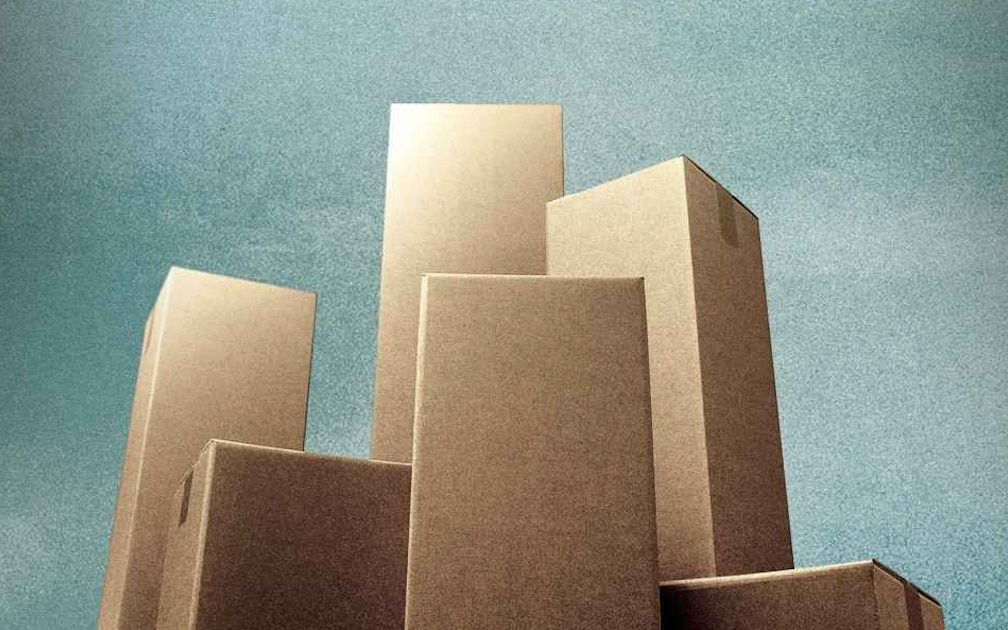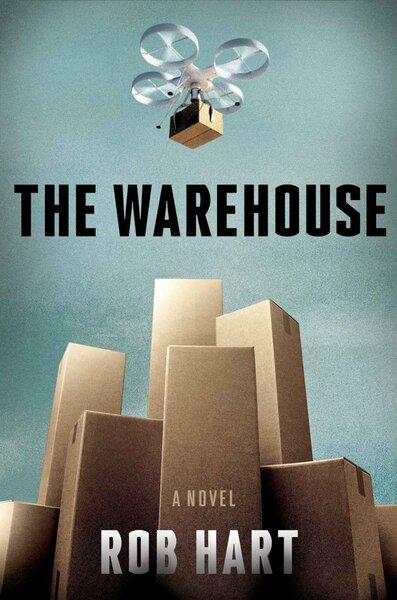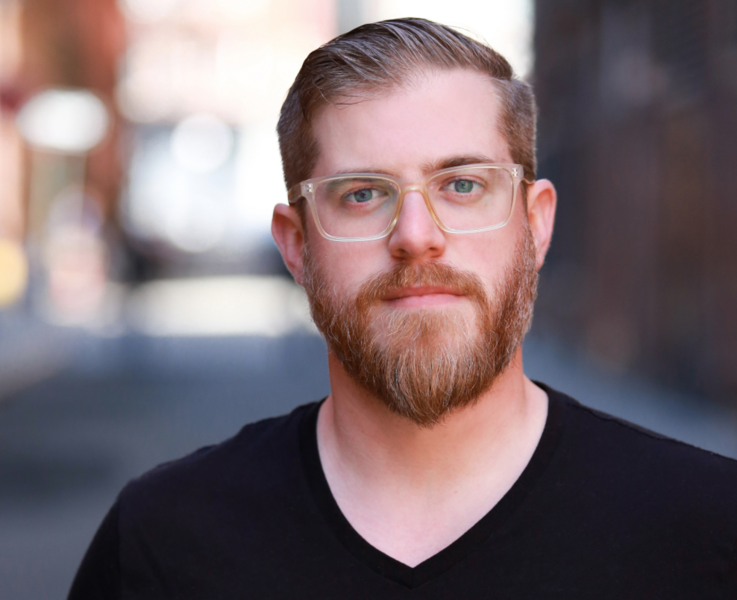Create a free profile to get unlimited access to exclusive videos, sweepstakes, and more!
Exclusive preview of Rob Hart's The Warehouse, Ron Howard's next film project

Part modern age consumerism cautionary tale, part near-future dystopian nightmare, author Rob Hart's engaging new sci-fi novel The Warehouse just shipped into the marketplace and its message just might make you think twice when dealing with today's omnipotent online retailers — and SYFY WIRE has ordered up an exclusive excerpt with comments from its inspired writer.
Its laser-focused plotline revolves around around a sinister corporation called Cloud (think evil Amazon) that dominates the American online retail landscape and constructs expansive live-work facilities for its multitude of employees. In this fearful-but-familiar world, Cloud isn’t just a place to work, it’s a place to reside, and one you might not ever want to leave.
This topical tale is already stirring up intense debate for its pointed skewering of rampant capitalism and last year the film rights were snapped up by Imagine Entertainment for director Ron Howard's (Apollo 11, Rush) next film project.
The Warehouse's narrative finds Paxton in joyous disbelief to be working for Cloud, the titanic tech company that’s devoured a huge chunk of the American economy. Now he's moving into one of the behemoth company’s sprawling live-work facilities. Compared to what’s left outside in the real world, Cloud’s generic chainstore environment of sparkling entertainment halls, open-plan offices, and vast cavernous warehouses doesn’t seem so bad.
Zinnia never thought she’d be infiltrating Cloud as an undercover agent inside its well-lit hallowed walls, risking it all to reveal the company’s darkest, most guarded secrets. Innocent Paxton with his simplistic hopes and fears might make the perfect pawn to sacrifice. As the shocking truth about Cloud is slowly uncovered, Zinnia risks everything on a reckless scheme that theatens both their lives. Together, they’ll ultimately learn just how far the corporation will go to make our planet a finer place when Big Brother meets Big Business.
Hart revealed the precise genesis of The Warehouse and exactly what triggered its absorbing near-future tale.
'I read this story and I thought: there’s a book here," he tells SYFY WIRE. "Just the image of people working in these vast warehouses, running themselves into the ground to fulfill a brutal algorithm, and even though the job sucked, people were lined up around the block, because it was that or nothing. From there, I just kept an eye on the news cycle, watched as things got worse, and finally got to a point where I realized that if I didn’t write this book, someone else would."
It seems like this is the perfect time for this type of conspiratorial cautionary story and Hart readliy agrees.
"I think people are becoming cognizant of two things: the way we’re killing ourselves so we can make rich people richer, and the way we interact with the economy. It’s getting harder to be an ethical consumer under capitalism because somewhere along the way, someone was exploited, or a whole lot of carbon was dumped into the atmosphere, so you to get your clothes or your phone or your groceries. I’m not sure this book would have worked five years ago."
With the A-list director Ron Howard attached to direct The Warehouse, we asked Hart what the Academy Award-winning filmmaker brings to the table.
"Ron Howard knows how to tell big stories that are grounded in character," he explained. "And The Warehouse doesn’t work without a strong connection to the characters. Plus he just makes really good movies — I’m a bit of a micromanager but I’m happy to just completely hand this off to him and his team. They’ve been incredible and they know what they’re doing."
Now enjoy our exclusive excerpt from The Warehouse by Rob Hart and tell us if this intriguing novel will be on your reading radar.
The lobby was filled with men and women in the RapidHire shirts. Some stood with tweezers and small plastic bags, smiling happy, friendly smiles. Each applicant was instructed to allow a person in gray to pluck a few hairs and place them into a plastic bag. Then the applicant was invited to write his or her name and Social Security number on the bag in black felt marker.
The woman collecting Paxton’s sample was almost perfectly round and shorter than him by a head. He had to bend down so she could reach. He winced as she ripped a few hairs from their roots, and he wrote his name on the bag, which he passed to another man who was waiting to run it off. As Paxton stepped over the threshold from the lobby to the theater, a stick-thin man with a bushy mustache handed him a small tablet computer.
“Take a seat and turn it on,” he said, his voice a practiced, disinterested monotone. “The interview process will begin shortly.”
Paxton hitched his bag on his shoulder and made his way down the aisle, the path worn almost to the subfloor. The space smelled like old, leaky pipes. He picked a row toward the front and moved to the middle. By the time he was settled into the hard wooden seat, his duffel next to him, there was a series of hard clicks at the rear of the theater as the doors latched shut.
His row was empty, save a woman with skin the color of baked earth and springy coils of dark brown hair piled high and unevenly atop her head. She wore a butterscotch sundress and matching flats, and sat toward the far end of the row, by the wall of the theater, where the ornate maroon wallpaper was marred by water stains. Paxton tried to catch her eye, smile at her, wanting to be polite, but also wanting to see more of her face, too. She didn’t notice him, so he looked down at the tablet. Pulled a bottle of water from his bag, downed half of it, and pressed the button on the side.
The screen flared to life, large numbers at the center of the display.
Ten.
Then nine.
Then eight.
When it hit zero, the tablet buzzed and flashed, and the numbers were replaced by a series of empty fields. Paxton balanced it on his lap and focused.
Name, contact information, brief work history. Shirt size?
Paxton’s hand hovered over Work History. He didn’t want to explain what he had done before this, and the confluence of events that had brought him to a broken theater in a broken town. Because to do that meant having to explain that Cloud had destroyed his life.
Anyway, what would he write?
Would they even know who he was?
If they didn’t, was that better or worse?
Paxton found he did, in fact, have more room for sadness, at the thought of applying for this job with CEO in the work history field.
His stomach knotted and he settled on the prison. Fifteen years. A long enough time to demonstrate loyalty. That’s what he would call it, if he were asked: loyalty. If someone wanted to know about the gap, those two years between the prison and now, he’d deal with it.
After he filled in all the fields, the next screen appeared.
Have you ever stolen anything?
Underneath were two buttons. Green Yes and red No.
He rubbed his eyes, the brightness of the screen making them ache. Thought back to when he was nine, standing by the spinning wire comic rack in Mr. Chowdury’s deli.
The comic book Paxton wanted was four dollars and he only had two. He could have gone home and asked his mother for the money, but instead he waited, his leg shaking, until a man came in and asked for a pack of cigarettes. As Mr. Chowdury bent down to where he kept the cigarettes underneath the counter, Paxton rolled up the comic, held it flush to his leg so it’d be out of view, and headed for the exit.
He walked to the park and sat on a rock and tried to read the comic but couldn’t concentrate enough to understand it. The artwork blurred and got muddy as he obsessed over what he had just done.
Broken the law. Stolen from someone who had always been kind to him.
It took him half the day to work up the nerve, but he went back to the deli; stood outside, waiting until he was sure there was no one else in there; then brought the comic book to the counter, carrying it like a dead pet. He explained through a hot gush of tears and phlegm that he was sorry.
Mr. Chowdury agreed to not call the police, or worse, his mother. But every time Paxton went into the deli after that—and it was the only deli within walking distance, so he had no choice—he could feel the old man’s eyes burning on his back.
Paxton read the question again and touched the screen over the red box marked No, even though it was a lie. It was a lie he could live with.
The screen flashed and a new question appeared.
Copyright © 2019 by Rob Hart. All rights reserved. Published in the United States by Crown, an imprint of Random House, a division of Penguin Random House LLC, New York. No part of this excerpt may be reproduced or reprinted without permission in writing from the publisher.

















